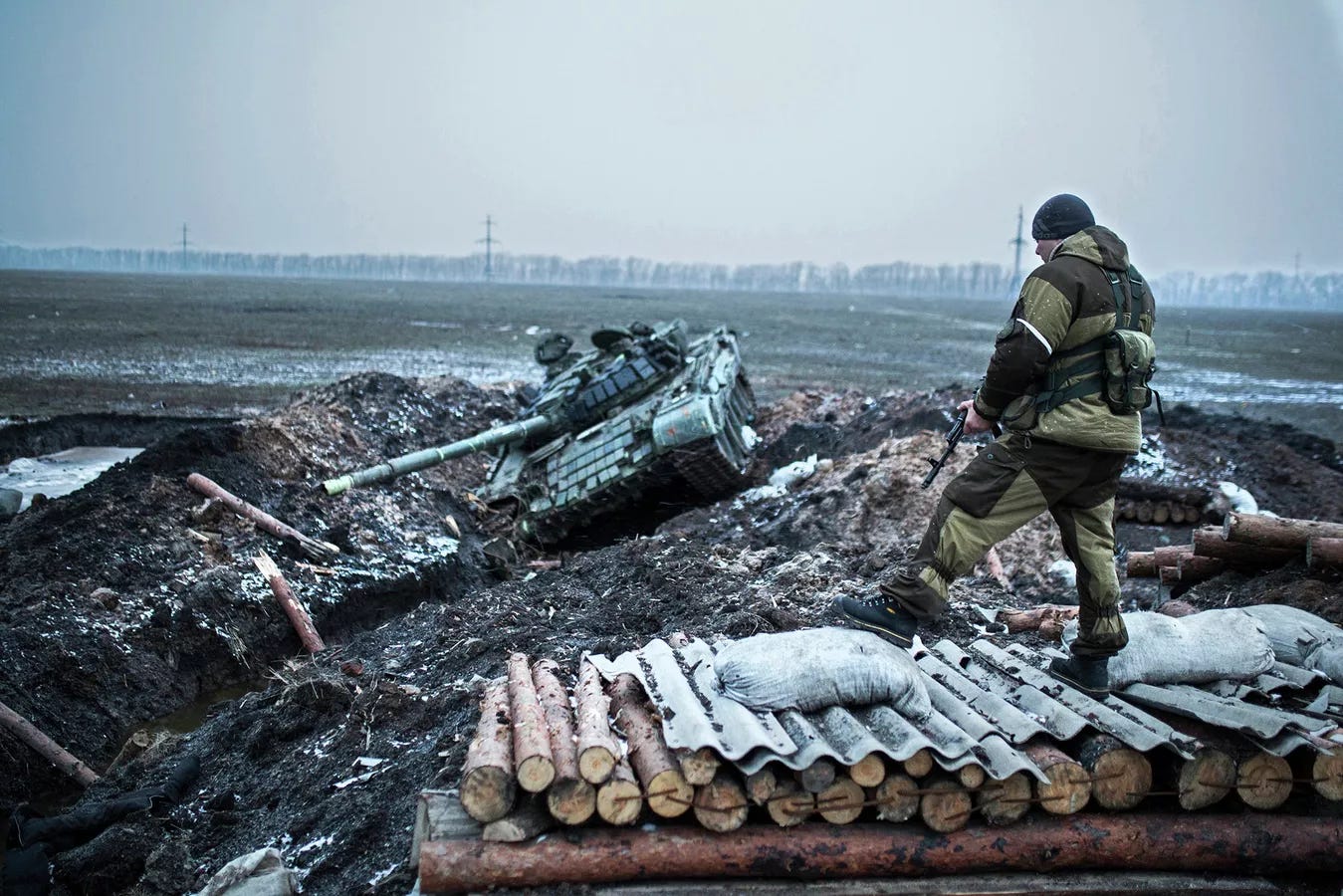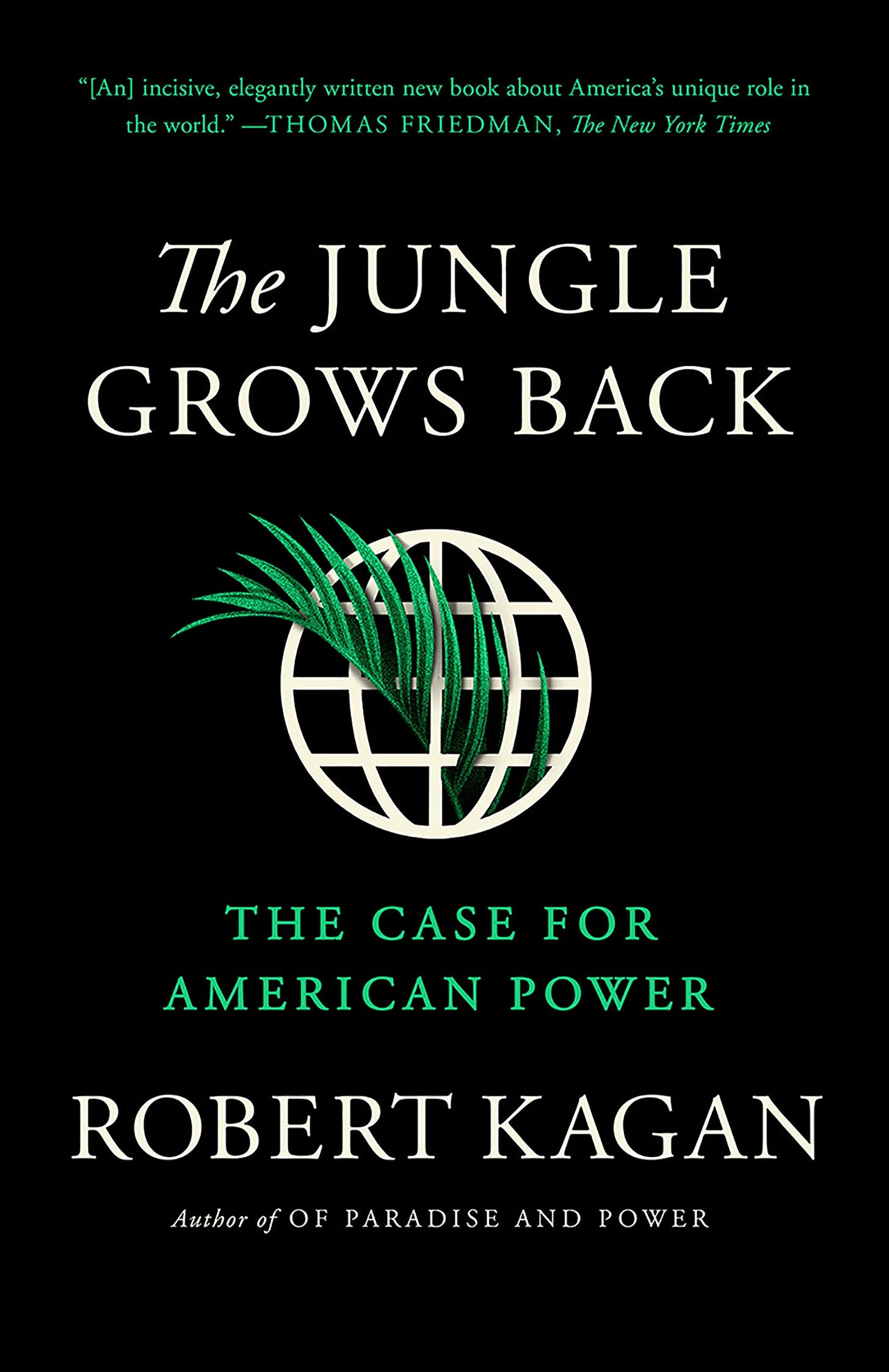From global village to cosmic battle, part one of three
The rules based international order and Ukraine
Introduction
The end of the cold war was once said to mean the end of ideological opposition. The violent politicization of the 20th century was over, replaced by benevolent market technocracy.
But despite its overwhelming economic, military superiority following the Soviet Union’s (auto)liquidation, the Western ‘civilization of values’ seemed ever further militarized and insecure. Yugoslavia, Iraq, Afghanistan, Libya. The rampages of NATO allies in the Congo and the Levant. And today, Ukraine.
The abstract division of the 20th century wasn’t replaced by a homogenous global village, but by the ‘rules-based international order’ and its Others. It is the peculiar tendency of this order towards exclusivity and violence that this essay will examine.
In the name of what is the world being torn apart between ‘democracy and autocracy’? Answers can be found by looking at the metropolitan centre, their think tanks and political statements. But the old and new cold wars were never merely fought between two superpowers. The space of their confrontation was the third world, the ‘undecided’ states.
The cold war differed qualitatively from the old European colonialism in that both sides tried to appeal to significant sections of the third world societies. The modern global chessboard has witnessed unprecedented attempts at societal programming in frontline states.
Ours is the era of unconventional, hybrid warfare. The western world has bet hard on liberal democratic ideology – ‘a human software virus’ or ‘political contagion’, in the words of Russian security analyst Andrew Korybko. Those infected ‘have truly been led to believe that their actions are spontaneous and ‘natural’, and that they represent the inevitable ‘progress’ that all areas of the world are bound to experience sooner or later’. What happens when this inevitable progress is halted?
This ideological battle has been harshly fought in Ukraine. In 2012-3, as few as 13% of Ukrainians supported joining NATO and only 48% were for joining the EU, while another 40% advocated joining the Eurasian Customs Union with Russia, Belarus and Kazakhstan. The Western nations did not focus on reprogramming the entire population, but instead on the intellectual middle classes.
They appealed to the Eurocentrism that is perhaps natural to the middle classes of a poor nation. They created and fostered an entire ecosystem of ‘civil society’ journalists and NGO activists dependent on western grant money. IT professionals that worked for western companies needed little more encouragement. At crucial moments, the Euro-Atlantic metropole was able to mobilize significant sections of society to go along with the middle-class avant-garde it had fostered over the years.
This article will examine the worldview of those Ukrainians who advocated their country’s integration into Euro-Atlantic structures, to join ‘the rules-based order’ of ‘Western civilization’.
What is the ‘rules based international order’? How are conflicts resolved within it? Why is it that a peculiarly unrefined militarism seeps through this ‘liberal’ discourse?
Theories of international liberalism and realism
In 2018 Robert Kagan – scion of his neo-conservative dynasty, husband of Victoria Nuland, and leading intellectual proponent of unipolar liberal idealism – published a book called the Jungle Grows Back. He argued that a liberal international order – the rules based international order – with universal freedom for capital and lack of large military confrontations between rival states, is a historically rare exception.
It was only because of the post-1945 differential in power between the USA and the rest of the world that it has been possible, and even more so after 1990. According to him, the norm of human history is ‘the law of the jungle’ – a world of competing nationalistic states, constantly engaged in destructive wars of conquest and mutual annihilation. To stop the nigh-inexorable growth of the nihilistic jungle, supposedly exemplified by Russia and China, US global power must be upheld by any means possible.
John Mearsheimer, leading advocate of a realist approach to international politics, argued instead in books such as the Great Delusion that attempts at erecting an international order were doomed to failure. This is because legal systems only exist when there is a state that can enforce them. This is operative at the national level, where citizens theoretically assent to being citizens of their state. This is manifestly not the case on the international level, where no global state exists.
Attempts to impose ‘international law’ will thereby be perceived as unconsented impositions by one state over others, leading to justified retaliation by the victims. This is why Mearsheimer, in contrast to Kagan, argues that any attempt to impose a liberal international order exacerbates global military instability. Liberalism can work at the national level but becomes self-destructive if applied internationally.
From theory to practice
The idea of international law became extremely popular in Ukraine following the 2014 annexation of Crimea by Russia. The new crop of Ukrainian state officials and intellectuals that took power in the 2014 EuroMaidan revolution/coup ceaselessly referred to the scriptures of international law to justify increased sanctions on Russia, military support to Ukraine, and the importance of Ukraine as a frontline state against jungle tyrannies.
The clash between geopolitical realists and liberal idealists took an intensely local character. In 2014, the democratically elected government of Viktor Yanukovych left power through non-electoral means following mysterious mass violence events on the 20th of February 2014. Political activists and politicians who supported the divisive platform EU-integration took power, embracing radical ethnonationalism with economic shock therapy as the side dish.
The eastern regions of Ukraine took to the streets in response. They had always supported social democrat politicians like Yanukovych, who embraced a more pluralistic (albeit vague) conception of Ukrainian identity. The eastern regions were economically dependent on the remaining soviet industry, whose reliance on trade with Russia and state economic protectionism was threatened by Euro-Atlantic integration.
Russia annexed Crimea. Around 50 anti-maidan protestors, all of Ukrainian citizenship and largely pensioners, were burned to death in Odessa on the 2nd of May 2014. In April, local separatists in the Donbass, assisted by Russian military adventurers like Igor Strelkov, ‘Pulled the trigger of war’, in Strelkov’s famous words. A harsh Ukrainian military response did much to feed the flames of conflict. After separatist military defeats – such as Strelkov’s July 2014 withdrawal from Slavyansk - the Russian federation began more concrete military aid. By late 2014 and early 2015, the Ukrainian army was savagely defeated in several battles. While regular Russian forces did not enter the fray, covert Russian military officers played an important role.
As has been the case in human conflicts over thousands of years, military reality forced one side to give in to the demands of its stronger enemy. One could say whatever about international law, but as usual, the balance of military strength decided events. In August 2014, Ukrainian forces were surrounded and methodically destroyed in the town of Ilovaisk. Ukrainian forces began withdrawing in surrounding villages. Ukrainian, Russian and separatist leaders met in Minsk, capital of Belarus. In September 2014, the first Minsk agreements were signed.
Fighting continued, until an even more crushing military catastrophe at Debaltsevo in January-February 2015. Anywhere from several hundred to several thousand Ukrainian soldiers were surrounded and killed. The second Minsk agreements were signed on February 12, 2015. Ukrainian president Poroshenko was constantly updated about the status of the battle in Debaltsevo throughout the Minsk negotiations, with mounting casualties and encirclement in the village leaving him no choice but to sign the agreements to prevent further collapse. Debaltsevo would fall five days later, with Ukrainian troops making a bloody retreat.

The Minsk agreements were highly unpopular among the forces that had just fought their way to power in the Euromaidan revolution. Around a hundred people had died on the streets of Kiev in December-February 2014, and thousands had died on the Donbass steppe in the name of Ukraine’s European future.
In the words of Ukrainian Truth in June 2014, a sort of Ukrainian New York Times that I will often reference, ‘‘We must understand that the war in the east is in fact a war against Russia for Ukraine and her European future… The world must know that Europe ends with us.’ A March 2022 editorial in the magazine ‘Zahid’ reiterated the sentiment – ‘This is a war for Europe’.
The Euromaidan movement had fought through blood, snow and mud to join the EU, and now eastern Ukrainians and the ‘northern wind’ were preventing them from doing so, with the Minsk agreements giving enhanced political rights to the (anti-EU) Donbass region. This was interpreted by Ukrainian liberals as Russia’s way of vetoing Ukraine’s euro-Atlantic ambitions.
EU and NATO membership had always been controversial or even unpopular throughout Ukraine. Were Donbass part of Ukraine, let alone with special political rights, there was every likelihood that the economic shock therapy embraced by the Euro-Atlantic liberals would have lost out to geopolitically realist, social democratic forces in the next elections. Even without Donbass, a perverted version of this outcome seemed to have taken place in 2019 with Zelensky’s victory.
Minsk, like any peace treaty, reflected the objective balance of forces. Ukraine’s army was weak, demotivated. The separatists were much more motivated and had support from proficient Russian military officers. Russia’s economy remained central to the global economy, while Ukraine’s GDP per capita was sliced in half from 2013 to 2015 and the twin blows of trade liberalization with the EU and war profoundly deindustrializing it.
Ukraine became a local battleground in the global clash between realist and liberal forces.
On the one side, the remnants of the Yanukovych and old business elite. Electorally supported by the industrial working class of the south-east, they advocated implementation of the Minsk agreements. The Ukrainian industrial oligarchy, despite having originally supported maidan to blunt Yanukovych’s threatening centralizing tendencies, began lobbying for an implementation of Minsk because of the economic suffering the war had caused them.
A pragmatic, realist approach – EU accession is unlikely, its economic liberalization destructive, and peace – as well as a resumption of trade with Russia – must be the top priority to regain a measure of prosperity and growth. By 2016, Ukraine had hunger levels higher than Brazil. Its GDP dropped from $190 billion in 2013 to $156 billion in 2020, only to momentarily ‘recover’ due to the rising raw material prices created by the covid quarantine.
On the other side, the liberal idealists. Squarely in power since 2014 and supported by the urban middle classes and pro-western ‘civil society’, they pushed hard against any implementation of Minsk. Implementation of Minsk was out of the question, since it ruined the Euro-Atlantic Ukrainian polity which guaranteed their status as protected elites.
At most, as ‘minister in charge of reintegration of the occupied territories’ Iryna Heraschenko and President Petro Poroshenko said, Minsk was a way to temporarily delay Russia’s military offensive and buy time to build up the Ukrainian army.
While that might seem to be a somewhat ‘realist’ argument, the reality is otherwise. Ukraine was never able to reach anything close to the economic and military potential of Russia, a country with a population four times larger and export revenues six times higher.
Ukraine’s entry into the rules-based international order thereby required the exclusion of the realist sections of society. There was a war of attrition against the old industrial elite through economic liberalization and the onslaught of Western-funded ‘Anti-Corruption’ organs. Electoral disenfranchisement of millions of problematic eastern Ukrainians became the norm. Articles appeared in the top liberal publications arguing that ‘only those who make rational, ethical choices can be given human rights’. To borrow from Evola - who seems paradoxically at home in ultraliberal Ukraine - the new Warrior society would have debased itself by extending suffrage to the Merchant and Slave castes.
If you like my work, consider becoming a paid subscriber.




Where are next 2 parts?